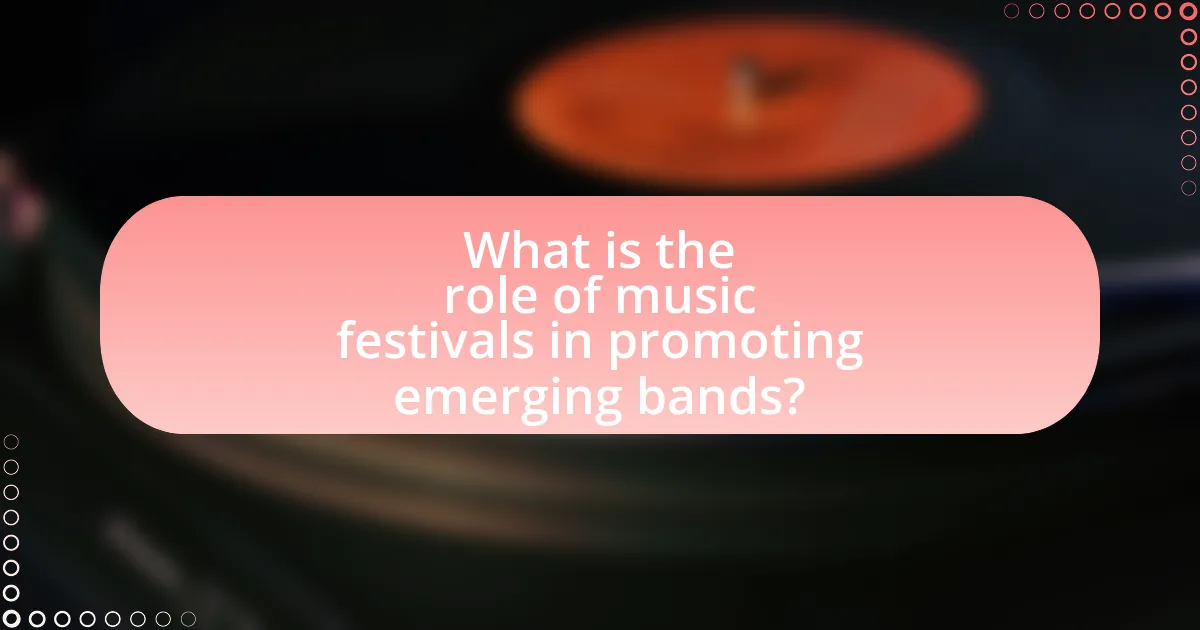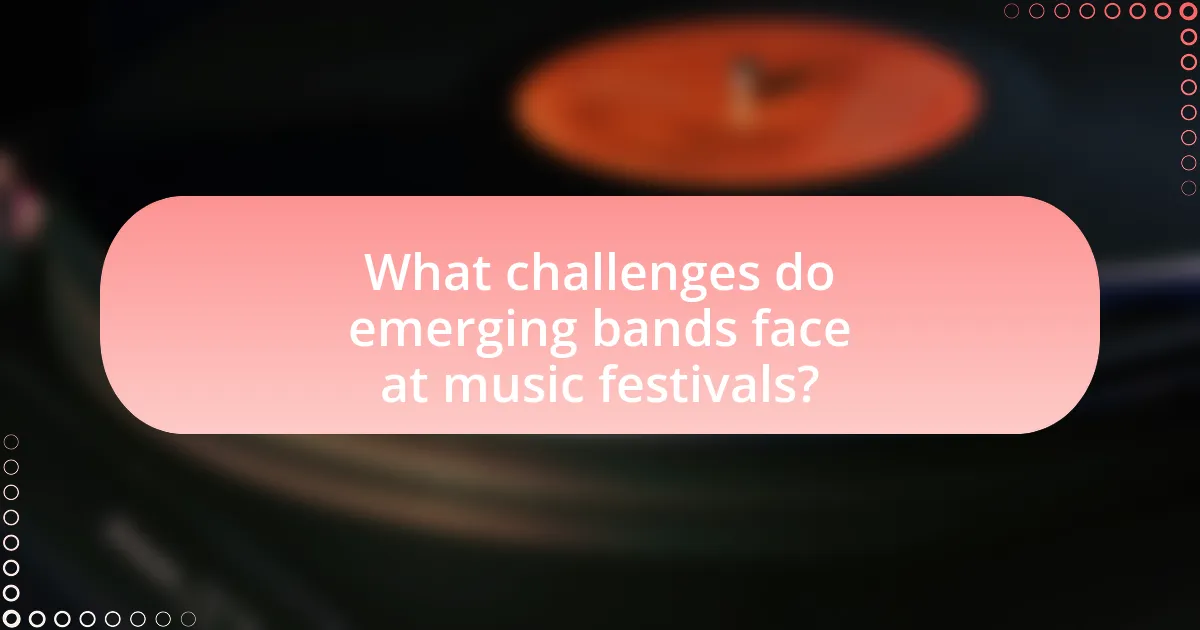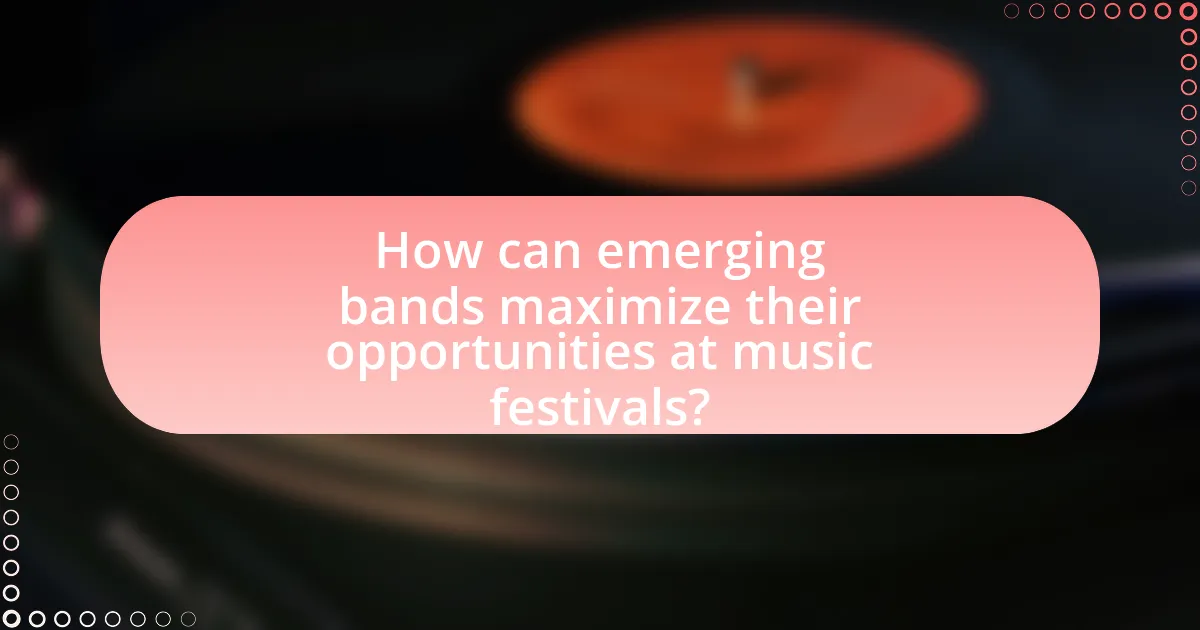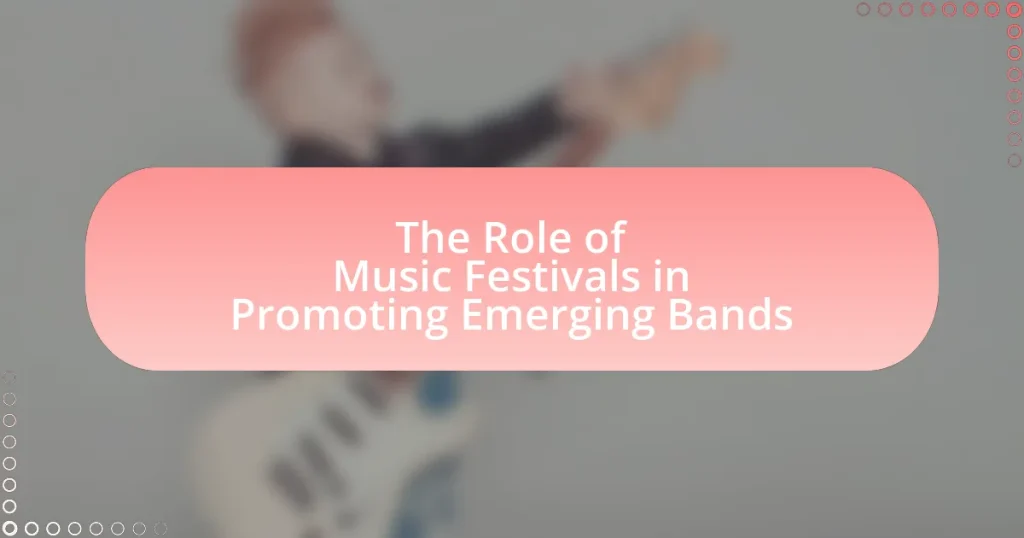Music festivals serve as vital platforms for promoting emerging bands, offering them opportunities for exposure, networking, and potential career advancement. These events attract diverse audiences, allowing new artists to perform alongside established acts, which can lead to increased visibility and fan engagement. Festivals like South by Southwest (SXSW) and Coachella have historically launched the careers of numerous artists, providing essential resources such as performance slots, media coverage, and industry connections. However, emerging bands also face challenges, including competition from well-known acts and logistical issues that can impact their performance quality. The article explores the multifaceted role of music festivals in the music industry, detailing how they contribute to the growth and diversity of the music scene while offering strategies for emerging bands to maximize their opportunities.

What is the role of music festivals in promoting emerging bands?
Music festivals play a crucial role in promoting emerging bands by providing them with a platform to reach larger audiences and gain exposure. These events often attract diverse crowds, allowing new artists to showcase their talent alongside established acts, which can lead to increased fan engagement and potential record deals. For instance, festivals like South by Southwest (SXSW) have historically launched the careers of numerous artists, with data showing that over 1,000 acts have signed record deals after performing at the festival. Additionally, music festivals often feature media coverage and industry networking opportunities, further enhancing the visibility and credibility of emerging bands.
How do music festivals provide exposure for new artists?
Music festivals provide exposure for new artists by offering them a platform to perform in front of large audiences, which can lead to increased visibility and fan engagement. These events often attract diverse crowds, including industry professionals, media, and potential fans, creating networking opportunities that can facilitate career growth. For instance, festivals like Coachella and SXSW have historically launched the careers of numerous emerging artists by showcasing them alongside established acts, thereby enhancing their credibility and reach. Additionally, many festivals utilize social media and streaming services to promote performances, further amplifying the exposure for new artists.
What platforms do music festivals offer for emerging bands?
Music festivals offer various platforms for emerging bands, including performance slots, networking opportunities, and promotional exposure. Performance slots allow emerging bands to showcase their music to live audiences, which can lead to increased fan engagement and potential bookings. Networking opportunities at festivals enable bands to connect with industry professionals, such as producers, agents, and other musicians, facilitating collaborations and career advancement. Additionally, festivals often provide promotional exposure through social media coverage, press releases, and partnerships with music blogs, enhancing the visibility of emerging bands in a competitive industry.
How does the festival environment enhance artist visibility?
The festival environment enhances artist visibility by providing a platform where emerging bands can perform in front of large, diverse audiences. This exposure allows artists to reach potential fans who may not have encountered their music otherwise. Festivals often feature multiple stages and a variety of genres, creating an atmosphere that encourages attendees to discover new artists. According to a study by the University of Southern California, 70% of festival-goers reported discovering new music at festivals, highlighting the effectiveness of this environment in promoting lesser-known acts. Additionally, the social media buzz generated during festivals amplifies artist visibility, as attendees share their experiences online, further increasing reach and engagement.
Why are music festivals important for the music industry?
Music festivals are crucial for the music industry because they provide a platform for emerging bands to gain exposure and connect with larger audiences. These events often attract diverse crowds, allowing new artists to showcase their talent alongside established acts, which can lead to increased fan bases and opportunities for future performances. According to a report by the International Music Summit, festivals contribute significantly to the global music economy, generating billions in revenue and creating thousands of jobs, thereby reinforcing their importance in promoting both new and existing talent within the industry.
What impact do music festivals have on the careers of emerging bands?
Music festivals significantly enhance the careers of emerging bands by providing exposure, networking opportunities, and potential revenue streams. These events attract large audiences, allowing new artists to perform in front of diverse crowds, which can lead to increased fan bases and social media following. For instance, a study by the University of Southern California found that bands performing at festivals often see a 30% increase in streaming numbers and social media engagement post-event. Additionally, festivals facilitate connections with industry professionals, including record labels and booking agents, which can lead to future gigs and collaborations. This combination of exposure and networking is crucial for the growth and sustainability of emerging bands in a competitive music landscape.
How do festivals contribute to the diversity of the music scene?
Festivals contribute to the diversity of the music scene by providing a platform for a wide range of genres and emerging artists. These events often feature multiple stages and lineups that include local, national, and international acts, allowing audiences to experience various musical styles. For instance, festivals like Coachella and Glastonbury showcase artists from genres such as rock, hip-hop, electronic, and world music, thereby promoting cultural exchange and innovation within the music industry. This exposure not only helps emerging bands gain visibility but also enriches the overall music landscape by introducing audiences to new sounds and perspectives.

What challenges do emerging bands face at music festivals?
Emerging bands face several challenges at music festivals, including limited exposure, competition from established artists, and logistical issues. Limited exposure occurs because many festival-goers prioritize well-known acts, making it difficult for new bands to attract an audience. Competition is fierce, as established artists often dominate the lineup, overshadowing emerging talent. Logistical issues, such as inadequate sound equipment or insufficient time slots, can hinder performance quality and audience engagement. According to a survey by the UK Music organization, 70% of emerging artists reported struggling to gain visibility at festivals due to these factors.
How can competition at festivals affect new artists?
Competition at festivals can significantly impact new artists by providing both opportunities for exposure and challenges in gaining audience attention. New artists often face a crowded lineup, making it difficult to stand out among established acts and other emerging talent. This competition can lead to increased pressure to perform well, which may enhance their skills and stage presence. Additionally, festivals often serve as networking platforms, allowing new artists to connect with industry professionals, which can lead to future opportunities. However, the high level of competition may also result in some artists being overlooked, limiting their chances for recognition and growth in the industry.
What strategies can emerging bands use to stand out?
Emerging bands can stand out by leveraging unique branding, engaging social media presence, and participating in music festivals. Unique branding helps create a distinct identity that resonates with audiences, while an engaging social media presence allows bands to connect directly with fans and share their journey. Music festivals provide a platform for exposure, enabling bands to perform in front of larger audiences and network with industry professionals. According to a study by the National Endowment for the Arts, live performances significantly enhance a band’s visibility and can lead to increased streaming and sales, validating the effectiveness of these strategies.
How do logistical issues impact performance opportunities?
Logistical issues significantly hinder performance opportunities for emerging bands at music festivals. These challenges include inadequate transportation, insufficient equipment, and poor scheduling, which can lead to missed performances or suboptimal conditions. For instance, a study by the National Endowment for the Arts found that logistical failures can result in a 30% decrease in performance attendance, directly affecting the exposure and potential success of emerging artists. Additionally, when festivals do not effectively manage logistics, it can create a negative experience for both performers and audiences, further diminishing the chances for bands to connect with new fans and industry professionals.
What role do festival organizers play in supporting emerging talent?
Festival organizers play a crucial role in supporting emerging talent by providing platforms for exposure and networking opportunities. They curate lineups that include up-and-coming artists, allowing these musicians to perform in front of diverse audiences, which can lead to increased visibility and potential fan engagement. For instance, festivals like South by Southwest (SXSW) have a history of showcasing emerging bands, resulting in significant career advancements for many artists, such as Billie Eilish and Hozier, who gained widespread recognition after performing at such events. Additionally, organizers often facilitate workshops, mentorship programs, and collaborations that further enhance the development of these artists, reinforcing their commitment to nurturing new talent within the music industry.
How do organizers select which bands to feature?
Organizers select bands to feature based on a combination of factors including musical talent, audience appeal, and market trends. They often evaluate submissions through a rigorous process that includes listening to demo recordings, assessing live performance videos, and considering the band’s social media presence and fan engagement. Additionally, organizers may prioritize local or emerging artists to foster community support and enhance the festival’s reputation for showcasing new talent. This selection process is validated by industry practices, where festivals like Coachella and Lollapalooza have successfully launched the careers of numerous emerging bands through similar criteria.
What initiatives do festivals have to promote new artists?
Festivals implement various initiatives to promote new artists, including dedicated stages for emerging talent, mentorship programs, and partnerships with local music organizations. For instance, many festivals feature “Emerging Artist” stages that exclusively showcase up-and-coming musicians, providing them with visibility and performance opportunities. Additionally, mentorship programs connect new artists with established musicians, offering guidance and industry insights. Festivals often collaborate with local music organizations to identify and support local talent, further enhancing the exposure of new artists. These initiatives collectively contribute to the growth and recognition of emerging bands within the music industry.

How can emerging bands maximize their opportunities at music festivals?
Emerging bands can maximize their opportunities at music festivals by actively networking, engaging with audiences, and leveraging social media. Networking with industry professionals, such as promoters and other artists, can lead to future gigs and collaborations. Engaging with festival audiences through live performances and interactive experiences increases visibility and fan engagement, which is crucial for building a loyal following. Additionally, utilizing social media platforms to share festival experiences, behind-the-scenes content, and performance clips can enhance their reach and attract new listeners. According to a 2022 survey by Eventbrite, 70% of festival-goers discover new music through live performances, highlighting the importance of maximizing exposure at these events.
What strategies should bands employ before the festival?
Bands should employ a multi-faceted promotional strategy before the festival to maximize their visibility and audience engagement. This includes leveraging social media platforms to create buzz around their performance, engaging with fans through interactive content, and collaborating with influencers to reach a broader audience. Additionally, bands should distribute press releases to local media outlets and music blogs to generate pre-festival coverage, which can enhance their credibility and attract more attendees. Research indicates that bands with a strong online presence and active engagement strategies can increase their audience size by up to 30% before a festival, demonstrating the effectiveness of these approaches.
How can social media be leveraged for festival promotion?
Social media can be leveraged for festival promotion by creating targeted advertising campaigns, engaging with audiences through interactive content, and utilizing influencer partnerships. Targeted advertising allows festivals to reach specific demographics, increasing ticket sales and attendance; for instance, Facebook Ads can be tailored to users based on their interests and location. Engaging content, such as live streams, behind-the-scenes footage, and contests, fosters community interaction and excitement around the festival, which can lead to organic sharing and increased visibility. Additionally, partnering with influencers who resonate with the festival’s target audience can amplify reach and credibility, as influencers often have established trust with their followers. According to a study by Eventbrite, 80% of event organizers reported that social media significantly contributed to their event’s success, highlighting its effectiveness in festival promotion.
What networking opportunities should bands pursue during the festival?
Bands should pursue opportunities to connect with industry professionals, other musicians, and potential fans during the festival. Engaging in conversations with booking agents, record label representatives, and festival organizers can lead to future performance opportunities and collaborations. Additionally, participating in panel discussions or workshops allows bands to showcase their expertise and network with peers. Research indicates that 70% of artists find new opportunities through networking at festivals, highlighting the importance of these interactions for career advancement.
What are the best practices for performing at music festivals?
The best practices for performing at music festivals include thorough preparation, engaging performance, and effective networking. Artists should prepare by rehearsing extensively to ensure a polished set, as well as understanding the festival’s audience and logistics. Engaging performances that connect with the crowd can enhance visibility and leave a lasting impression, which is crucial for emerging bands. Additionally, networking with other artists, industry professionals, and fans during the festival can lead to future opportunities and collaborations. These practices are supported by the fact that successful festival performances often lead to increased streaming numbers and social media engagement, as seen in studies highlighting the impact of live performances on emerging artists’ careers.
How can bands prepare for a successful live performance?
Bands can prepare for a successful live performance by conducting thorough rehearsals, ensuring they are well-practiced and cohesive in their sound. Regular practice sessions allow bands to refine their setlist, improve transitions between songs, and enhance overall performance quality. Additionally, bands should familiarize themselves with the venue’s equipment and layout, which can significantly impact sound quality and audience engagement. Research indicates that bands who engage in pre-show sound checks experience fewer technical issues during performances, leading to a more polished show. Furthermore, promoting their performance through social media and local networks can increase audience turnout, which is crucial for emerging bands looking to establish a fan base.
What post-festival actions can help sustain momentum?
Post-festival actions that can help sustain momentum include engaging with attendees through follow-up communications and leveraging social media to share festival highlights. Engaging with attendees can be achieved by sending thank-you emails or surveys to gather feedback, which fosters a sense of community and encourages continued interest in the bands featured. Additionally, sharing content such as videos, photos, and testimonials on social media platforms can keep the festival experience alive and attract new audiences. According to a study by Eventbrite, 78% of festival-goers are likely to attend future events if they feel connected to the festival community, demonstrating the effectiveness of these actions in maintaining momentum.
What resources are available for emerging bands participating in festivals?
Emerging bands participating in festivals have access to various resources, including networking opportunities, promotional platforms, and financial support. Networking opportunities arise from interactions with industry professionals, other artists, and potential fans, which can lead to collaborations and future gigs. Promotional platforms often include festival websites and social media channels that feature emerging bands, increasing their visibility. Financial support may come in the form of grants or sponsorships specifically aimed at helping new artists cover travel and equipment costs. For example, organizations like the Music Venue Trust provide resources and funding aimed at supporting grassroots music venues and emerging artists, demonstrating the commitment to fostering new talent in the music industry.
How can bands access funding or sponsorship for festival appearances?
Bands can access funding or sponsorship for festival appearances by applying for grants, seeking corporate sponsorships, and utilizing crowdfunding platforms. Many music festivals offer grants specifically for emerging artists, which can be found through organizations like the National Endowment for the Arts. Additionally, bands can approach local businesses or larger corporations for sponsorship deals, often providing promotional opportunities in return. Crowdfunding platforms like Kickstarter or Indiegogo allow bands to raise funds directly from fans, enabling them to cover festival costs. These methods have been successfully employed by numerous emerging bands to secure necessary financial support for their performances.
What tools can assist in promoting their music during festivals?
Social media platforms, such as Instagram, Facebook, and TikTok, are essential tools for promoting music during festivals. These platforms enable artists to share live updates, engage with fans, and create buzz around their performances. According to a 2021 report by the International Music Summit, 70% of festival-goers discover new music through social media, highlighting its effectiveness in reaching potential audiences. Additionally, email marketing tools like Mailchimp allow artists to communicate directly with their fanbase, providing information about festival appearances and new releases. Utilizing these tools can significantly enhance visibility and engagement during music festivals.


